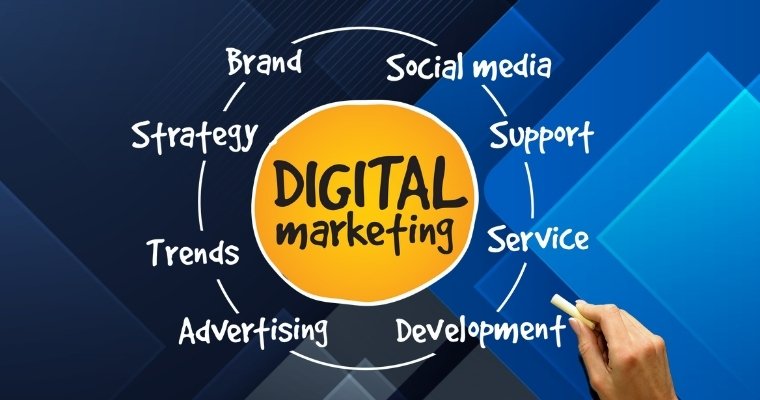Digital Marketing is a broad field that involves promoting products or services using digital channels such as search engines, social media, email, and websites. One key component of digital marketing is Search Engine Optimization (SEO), which focuses on improving the visibility of a website or webpage in search engine results to drive organic (unpaid) traffic.
What is SEO?
SEO refers to the process of optimizing your website to rank higher on search engine result pages (SERPs) like Google, Bing, and Yahoo. The goal is to make your website more attractive to search engines so they prioritize your content when users search for related information. SEO is crucial for increasing traffic, improving user experience, and ultimately driving conversions.
Key Elements of SEO:
1. On-Page SEO:
- Keywords: Identifying and using the right keywords (terms people are searching for) in your content.
- Title Tags & Meta Descriptions: Optimizing the HTML tags to clearly describe the content of the page and encourage clicks.
- URL Structure: Using clean, descriptive URLs that are easy for users and search engines to understand.
- Headings (H1, H2, etc.): Structuring content using proper headings for better readability and SEO ranking.
- Internal Linking: Linking to other pages on your site to improve navigation and help search engines crawl your website more effectively.
- Content Quality: Creating valuable, relevant, and engaging content that answers users’ search queries.
2. Off-Page SEO:
- Backlinks: Getting links to your website from reputable, authoritative websites. Quality backlinks are one of the strongest ranking factors in SEO.
- Social Signals: Increased engagement and mentions on social media platforms can indirectly improve your SEO.
- Guest Posting: Writing articles for other websites to earn backlinks to your site and increase your site’s authority.
3. Technical SEO:
- Mobile Optimization: Ensuring that your website is fully optimized for mobile devices.
- Page Speed: Enhancing load times for better user experience and higher rankings. Slow pages can negatively impact SEO.
- XML Sitemap: Submitting a sitemap to search engines to help them crawl your site efficiently.
- Robots.txt: Properly using robots.txt files to manage which parts of your site should be crawled and indexed by search engines.
- Secure Website (HTTPS): Websites with an SSL certificate (HTTPS) rank better than non-secure sites (HTTP).
4. Local SEO:
- Google My Business (GMB): Creating and optimizing a Google My Business profile is essential for local businesses to appear in local search results.
- Local Citations: Getting your business listed on local directories and platforms like Yelp and Bing Places for Business.
- Customer Reviews: Positive reviews on GMB and other review platforms can boost your local SEO and attract more local traffic.
SEO Best Practices:
- Keyword Research:
- Use tools like Google Keyword Planner, Ahrefs, or SEMrush to find high-value keywords that match your audience’s search intent.
- Focus on both short-tail (e.g., “shoes”) and long-tail keywords (e.g., “best running shoes for men”).
- Content Creation:
- Write high-quality, informative content that addresses the needs and questions of your audience.
- Regularly update your website with fresh content to keep it relevant to both users and search engines.
- Optimize for Mobile:
- With mobile-first indexing, Google predominantly uses the mobile version of content for indexing and ranking. Make sure your site is mobile-friendly.
- Monitor Performance:
- Use tools like Google Analytics and Google Search Console to monitor traffic, keyword rankings, and other important metrics.
- Identify which pages are performing well and which need improvement.
- Keep Up with Algorithm Changes:
- Search engines like Google update their algorithms frequently. Staying informed about these changes can help you adjust your SEO strategy accordingly.
Why SEO is Important in Digital Marketing:
- Increased Visibility: Appearing on the first page of search engine results can significantly increase your website’s visibility.
- Cost-Effective: SEO drives organic traffic, which doesn’t require the continuous investment that paid ads do.
- Long-Term Strategy: Unlike paid ads, which stop driving traffic when you stop paying, SEO has long-lasting effects if done correctly.
- User Experience: Many SEO practices, such as improving site speed and mobile usability, also enhance the overall user experience.
Conclusion:
SEO is a fundamental aspect of digital marketing that helps websites attract more organic traffic, improve visibility, and increase conversions. By optimizing both on-page and off-page elements, focusing on technical improvements, and keeping up with algorithm changes, you can create a strong SEO strategy that supports your overall digital marketing efforts.






